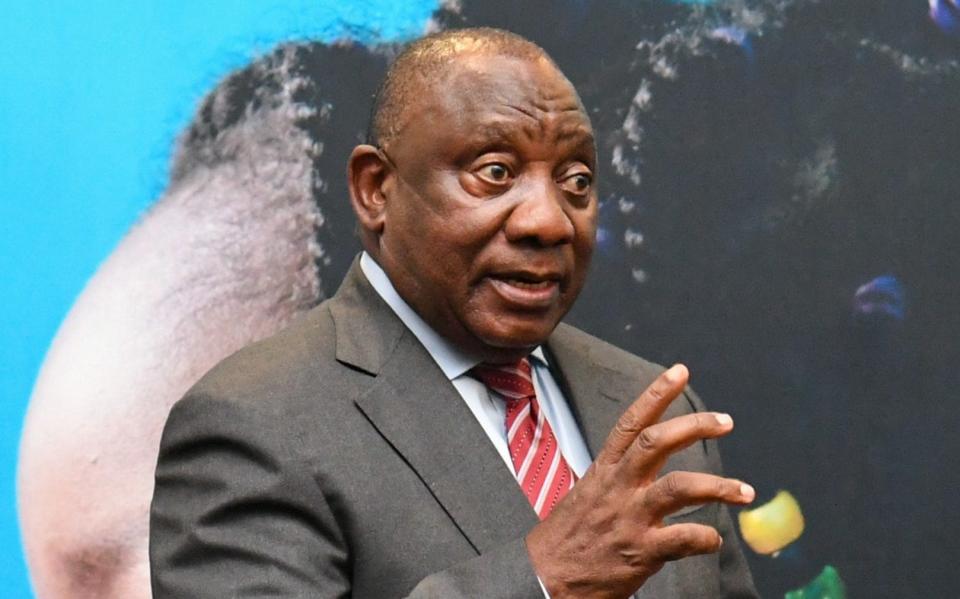Cyril Ramaphosa under investigation after 'theft' of large amount of cash from his game farm

Images of majestic sable antelope emblazon the game farm's security gates, and nearby CCTV cameras keep watch on its kilometres of fencing. Beyond the wire, hidden from view by acacia trees, are the South African president's prized livestock, which can raise eye-watering sums at auction.
Cyril Ramaphosa's Phala Phala farm, a two-and-a-half hour drive north of Johannesburg, sits surrounded by wealthy white landowners in an area where it would once have been unthinkable for a black man to have land.
His farm is all the more remarkable because 69-year-old Mr Ramaphosa began life as the son of a humble policeman. He rose through the trade union movement during the struggle against apartheid, eventually becoming Nelson Mandela's favoured political heir, and also made a fortune in business.
Friends of the president say it is here, among his animals in Limpopo province, that he is happiest. Yet in recent months, a farm that has long offered refuge from the pressures of politics has itself become the source of a political scandal.
Phala Phala has been in the headlines for week after week, at the centre of a murky affair allegedly involving a former spy chief, sofa cushions stuffed with foreign currency and a covered up burglary.

As the scandal has intensified, Mr Ramaphosa has failed to clear up questions about exactly what happened and he was this week grilled by MPs and forced to deny accusations of money laundering.
Meanwhile parliament has set up a panel to investigate the affair and report back next month on whether there might be grounds for an impeachment inquiry.
The scandal comes at a dangerous time for both Mr Ramaphosa and his African National Congress (ANC) party, which has governed the country since 1994. Commentators are beginning to question whether it might seriously damage the political prospects of a man many had hoped would straighten out the country after the shameless looting conducted under his disgraced predecessor, Jacob Zuma.
Susan Booysen, professor emeritus at the University of the Witwatersrand and author of several books on the ANC, said: “I still believe it is incredibly bad for Cyril, even given his explanations in parliament, as they were still vague and scarce on detail.
“He has not made much headway in taking the nation into his confidence, and I really think there is irretrievable damage to his credibility in the perceptions of the politically conscious voting public.”
The scandal erupted in June, when a former intelligence chief called Arthur Fraser walked into a police station in Johannesburg and filed a criminal complaint. He accused Mr Ramaphosa of kidnapping, bribery, money laundering, and “concealing a crime” in relation to the alleged theft of $4 million (£3.6 million) from Phala Phala.

Mr Fraser, a close ally of Mr Zuma, said burglars broke into the 11,120-acre farm in February 2020 and stole large sums of US dollars hidden in the furniture. He alleges the president then tried to hush up the robbery, paying staff to keep quiet.
Mr Ramaphosa has said the money came from the sale of livestock, and he reported the theft to his head of presidential protection. He denies wrongdoing.
Yet otherwise he has given little away, saying he cannot comment with a police investigation underway.
Why so much cash was allegedly hidden in furniture in his farm, what it was for and why the theft took more than two years to be disclosed remains a mystery. The allegations and his silence have dented his reputation as a leader intent on cleaning up both South Africa's corruption-tainted government and the ANC.
"I deny that there was any form of money laundering," he told parliament last week. "It was the proceeds of the sale of game.”
Certainly, his stud-breeding activities and prized herds of buffalo, antelope and long-horned Ankole cattle bring in plenty of money. In 2018 he was reported to have sold a bull buffalo for £200,000, among £1 million of cattle at a single auction. Other farmers in the area told The Telegraph his farm was well run and efficient and he was well-liked by neighbours despite their different backgrounds.

The timing of the scandal is all the more sensitive because Mr Ramaphosa is standing to be re-elected as leader of the ANC at the party's conference in December. He is also seeking backing to stand for a second term in 2024 national elections. Long-term ANC-watchers have speculated the cash could have been a slush fund to sure-up his political support going into the conference, where he will face determined opposition from factions still loyal to Mr Zuma.
Mr Ramaphosa remains the favourite to be re-elected ANC leader and president, despite the investigations, reckons John Matisonn, a veteran political analyst and author of a book on the president.
“But Ramaphosa remains vulnerable. We still don’t know whether the money found in his home was properly accounted for to the authorities and whether it was intended to fund his presidential bid improperly.
“And the president’s political enemies in opposition and within his own party remain intent on keeping it alive," said Mr Matisonn.
“There is a good chance they will be successful in electing some of his political enemies in the old Jacob Zuma faction to the top six executives who will run the ANC, to hamper Ramaphosa’s freedom of movement even if he wins.”

 Yahoo Sport
Yahoo Sport 





































